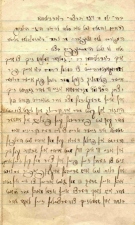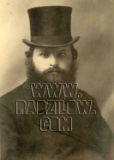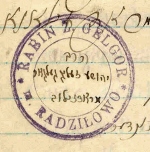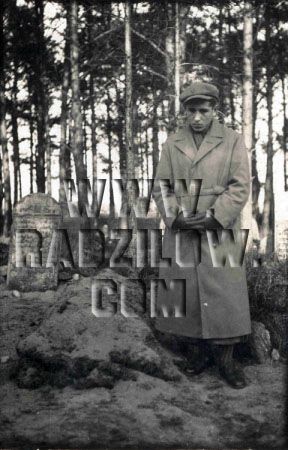Fourth day of the week, Parashat Vayigash, 5695,
Radzilow
[Corresponds to Wednesday, December, 12, 1934]**
With blessings for peace and all good things, to
the honorable, esteemed Mr. Nachman Rozenbaum, may he live long good days,
greetings to him and all who come into his presence.
|
|
|
|
 |
|
First page of 4-page letter written by the
Radzilow Rabbi
Yehoshua Zelik Gelgor |
|
|
| |
|
|
|
|
|
 |
|
Rabbi Yehoshua
Zelik Gelgor
Killed in Radzilow, 1941 |
|
|

|
|
Rabbi Gelgor's Seal on the last page of his letter |
|
| |
|
|
I, the Rabbi of Radzilow, Y. Gelgor, turn to you
though I do not know you, seeking your compassion for your nephew Zundel, son of
your brother Yitzchak from Grajewo, who is in frightful condition, simply dying
from hunger and cold. He is sick and bedridden, unable to earn anything. Our
shtetl is very poor because of the crisis prevailing in Poland. Thus we cannot
help him, and since I am a neighbor of his, I cannot witness his poverty and
destitution and not write it down on paper. It is very upsetting when one enters
his home. He is above all a sensitive man; he is embarrassed to talk about his
situation. He keeps silent, but as a neighbor I know of his poverty. My
conscience dictated that I should ask him for an address of friends abroad and
write to them telling how their friend Zundel, son of Yitzchak, Rabbi of
Grajewo, is naked and barefoot and hungry and his entire family is starving. He
has three nice grown marriageable daughters who all sit at home with nothing to
do. They would want to work but there is no work and there are no proposed
matches since no one wants to marry a poor girl. Every young man wants a woman
with a dowry. These girls don't even have proper clothing, and on top of
everything, now is the terrible winter with a great frost and he doesn't even
have fuel with which to heat the oven. His situation is very sad. So it is my
holy duty to alert and awaken pity for him and his whole family and not allow
him and his whole family to die of hunger and cold and be evicted from his
residence since he doesn't have money to pay rent. Therefore you must know that
if you direct your tzedokeh [charity] to this place, you will simply save people from
dying of starvation. I hope my words will enter deep into your human heart and
you will as quickly as possible send help to their own address and thus may you
and your wife Feige live long days and years and have much joy and pleasure from
your children. And if it is not possible for you personally, seek help from
strangers and from acquaintances.
|
|
|
 |
| |
|
Yehoshua Z. Gelgor, The Rabbi of Radzilow
P.S. As much as I have written of their poverty,
it is only a fraction of the actual situation.
|
|
|
|
|
Explanatory notes: According to Pages of Testimony submitted at Yad Vashem by other Radzilow
landsmen, Rabbi Yehoshua Zelik Gelgor was killed in the Holocaust.
Nechemiah Rozenbaum was the brother of Rabbi Yitzhak Hershel
Rozenbaum, who was the Rabbi of Grajewo for about 30 years. When Rabbi Rozenbaum
became ill and could no longer continue his duties, his son-in-law, Moshe Mendel Goldberg
(originally from Garwolin, Poland, who was married to Yitzhak's daughter Estera) took over the position until he left for Australia in 1938. Zundel was Rabbi Rozenbaum's son, and he
moved to Radzilow upon marrying Rochla Gittel Sawicki, from a well-established
Radzilover family. Mosze Szymon Rozenbaum, born in Radzilow, was the youngest of Zundel's five children.
After a deadly pogrom in Radzilow in 1933 in which 5 people were killed (starting
with 1 Jewish woman from Jedwabne who was in Radzilow on market day, and
then 4 Poles, shot by the police as they tried to control the riot that
ensued, by shooting into the air), Mosze Szymon tried desperately
to emigrate, aware that the situation for the Jews was rapidly deteriorating. He wrote letters
to all his family abroad, begging them to provide the necessary documents
enabling him to leave Poland. He was only 12 years old at the time. Finally, in late
February of 1939 he was able to emigrate, first going to
London, where he stayed with the Kissin family (his aunt Sarah had married
Abraham Kissin in London), then on to Shepparton, Australia, on March 12, 1939. He
was the only member of his immediate family to have survived the Holocaust,
as his four siblings and mother were killed on July 7, 1941. Many of his
Sawicki cousins were also murdered.
Zundel had passed away on January 22, 1939. [See photo on right.]
Mosze Szymon became a very
successful businessman in Australia, and was planning a return visit to
Radzilow, along with his daughter, in the summer of 2002. Unfortunately, he
became ill and passed away in December 2001. His daughter Helen will
complete the trip in his honor.
|
|
|
|
Additional Material: |
|
|
 |
Helen Rosenbaum's tribute to her
father Mosze Szymon, based on his own handwritten memoirs about his life
in Radzilow and
Australia |
|
|
 |
More
of Mosze Szymon Rozenbaum's magnificent collection of Radzilow
photos and memorabilia |
|
|
|
|
 |
|
Mosze Szymon Rozenbaum, Late February 1939,
shortly before leaving Radzilow, paying his
last respects at the fresh grave of his father, Zundel Rozenbaum, who had passed away
only four weeks earlier on Jan 22, 1939.
This is the only photo ever uncovered of
the Radzilow Cemetery, which no longer exists.
Went to Australia, 1939 |
|
|
|
|
|
Letter contributed by Helen Rosenbaum,
Zundel
Rozenbaum's granddaughter.
*Translated from Yiddish by: Helen Lewis. Edited by: Jose
Gutstein.
Editor's notes or definitions are entered in [brackets].
Copyright © 2002 by Jose Gutstein and Helen Rosenbaum.
All rights reserved to the original letter, pictures and the translation.
**Rabbi Gelgor dated his letter in the traditional
way by reference to the day of the week (four) and the portion of the
week (Vayigash) and the Hebrew year (5695). Parashat means (weekly) portion.
Vayigash is the eleventh of the twelve weekly portions of Genesis, the first
book of the Torah. Parashat Vayigash means the portion Vayigash. Sunday, on the
Hebrew calendar, is the first day of the week. The fourth day of the week is
Wednesday, which, in the week of Parashat Vayigash in the Hebrew year 5695
corresponds to Wednesday, December 12, 1934.
|
|
|
|